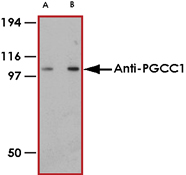
Anti-PGCC1
Rabbit Polyclonal Antibody
Catalog No. P845-363R
| Catalog No. | Pack Size | Price (USD) | |
|---|---|---|---|
| P845-363R-100 | 100 ug | $595 | |
| P845-363R-BULK | BULK | Contact Us |

Rabbit Polyclonal Antibody
Catalog No. P845-363R
| Catalog No. | Pack Size | Price (USD) | |
|---|---|---|---|
| P845-363R-100 | 100 ug | $595 | |
| P845-363R-BULK | BULK | Contact Us |
Overview:
The transcription factor peroxisome proliferator-activated receptor gamma (PPARg) plays essential roles in adipogenesis by regulating adipocyte-specific genes through association of various co-factors. One such co-factor, PGCC1 (also known as FAM120B), is widely expressed in adult tissues and throughout embryonic development. Overexpression of this protein in OP9 pre-adipocytes promoted their differentiation into adipocytes, and knockdown of PGCC1 expression through RNA interference blocked this process. PGCC1 is homologous to C9orf10 (also known as FAM120A) and has been mapped to chromosome Xp11.22. At least two isoforms of PGCC1 are known to exist.
Specificity:
Recognizes the PGCC1 protein
Cross Reactivity:
Human, Mouse and Rat
Host / Isotype / Clone#:
Rabbit, IgG
Immunogen:
PGCC1 antibody was raised against an 18 amino acid synthetic peptide from near the carboxy terminus of human PGCC1.
Purification:
Affinity chromatography
Stability:
Store at 4oC (add 0.1% NaN3) for several months, and at -20oC for longer periods. For optimal storage, aliquot target into smaller quantities after centrifugation and store at recommended temperature. For most favorable performance, avoid repeated handling and multiple freeze/thaw cycles.
Sample Data:
Western blot analysis of PGCC1 in rat thymus tissue lysate with Anti-PGCC1 antibody at (A) 0.5 ug/mL and (B) 1 ug/mL.

|
References :
1. Berger J and Moller DE. The mechanisms of actions of PPARs. Annu. Rev. Med.2002; 53:409-35.
2. Li D, Kang Q, and Wang D-M. Constitutive coactivator of peroxisome proliferator-activated receptor (PPARg), a novel coactivator of PPARg that promotes adipogenesis. Mol. Endocrin.2007; 21:2320-33.
3. Holden S and Raymond FL. The human gene CXorf17 encodes a member of a novel family of putative transmembrane proteins: cDNA cloning and characterization of CXorf17 and its mouse ortholog orf34. Gene2003; 318:149-61.
There are no related publications available for this product.
Cancer, Metabolic Disorder
STAY CONNECTED
Fax: 1-604-232-4601